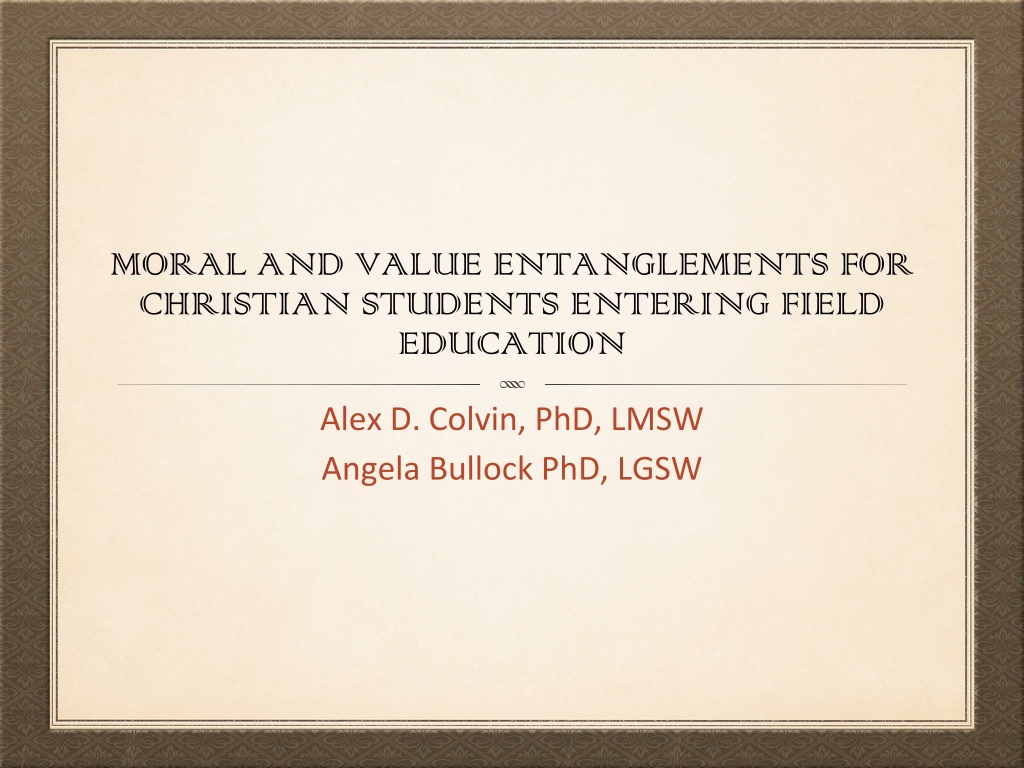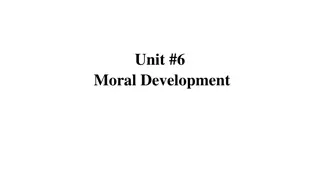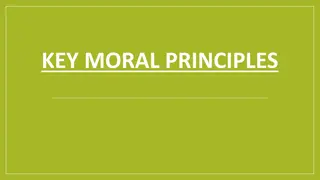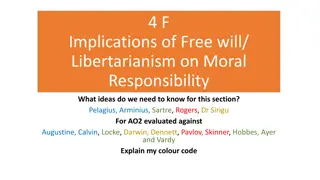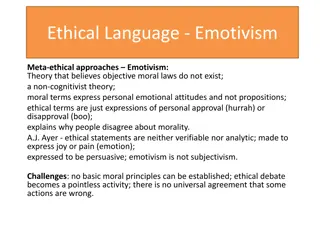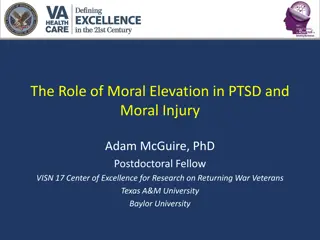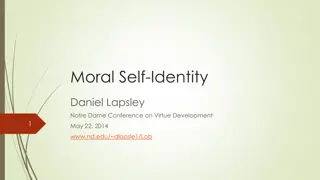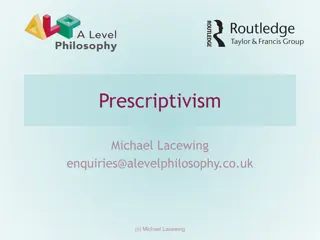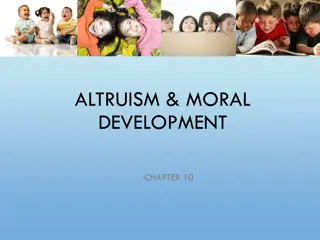Navigating Moral and Value Challenges for Christian Students in Field Education
This presentation explores the moral and value dilemmas faced by Christian students entering field education in social work. It addresses the conflicts that may arise due to differences in morals, values, and beliefs, offering strategies to assist students in navigating these challenges effectively.
Download Presentation

Please find below an Image/Link to download the presentation.
The content on the website is provided AS IS for your information and personal use only. It may not be sold, licensed, or shared on other websites without obtaining consent from the author. Download presentation by click this link. If you encounter any issues during the download, it is possible that the publisher has removed the file from their server.
E N D
Presentation Transcript
MORAL AND VALUE ENTANGLEMENTS FOR CHRISTIAN STUDENTS ENTERING FIELD EDUCATION Alex D. Colvin, PhD, LMSW Angela Bullock PhD, LGSW
OBJECTIVES Understand the current stance regarding the integration of Religion and Christianity in social work practice. 1. Examine the moral and value dilemmas faced by Christian students entering field education. 2. Discuss strategies to assist the Christian social work student facing moral dilemmas as they enter field education. 3.
The purpose of this presentation is to address the conflicts students may face with Christian morals, values, and beliefs when entering field education settings and discuss strategies to help students who are grappling with such dilemmas.
INTRODUCTION Social work is a profession that requires the integration of knowledge, skills and values in a way that promotes individual, familial, community, and social well-being. Within the study of social work, field education is arguably the most significant component of the social work curriculum in preparing competent, effective, and ethical social workers (Bogo, 2015).
INTRODUCTION This is evidenced by the CSWE designating field education the signature pedagogy, which affirms its importance and pivotal role in preparing the next generation of social workers (Bogo, 2015; Council on Social Work Education, 2008). As the signature pedagogy, field education is the component of social work education where students are able to practice social work skills through educationally focused service experiences in agency and community settings (Council on Social Work Education, 2008). Field education allows students to become socialized to think and act like social workers (Bogo, 2015).
INTRODUCTION Organizations that participate in social work education by providing internships are called field placements (Birkenmaier & Berg-Weger, 2007).
BACKGROUND Social work is rooted in personal values and beliefs which usually result in working with marginalized populations. As such, some individuals feel called to enter social work because of the harmony between their religious convictions and social work ideals (Dessel, Jacobsen, Levy, McCarty-Caplan, Lewis, & Kaplan, 2017).
BACKGROUND Many students decide on the social profession because they feel a sense of responsibility to help others and improve the world they live in. Matthew 20:26- 28 is a key passage supporting Christian service. In this passage Jesus Christ states that even He came to serve and not to be served.
BACKGROUND Challenges however may arise when the student s principles of faith collide with social work values (Wilkinson, 2012). This may cause some students to experience internal conflicts and tensions which may lead to ambivalence about how to serve certain individuals, groups, or communities and may potentially lead to unethical practice (Dessel, Jacobsen, Levy, McCarty-Caplan, Lewis, & Kaplan, 2017).
SOCIAL WORK OBLIGATIONS AND DUTIES The National Association of Social Work (NASW) recognizes religion and spirituality as components of cultural diversity (NASW, 2007, p.4). The integration of religious and spiritual interventions in social work has been heavily debated. Imposing religious beliefs on clients, however well intended, violates a client s rights to self-determination (Reamer, 2013, NASW, 2008, Standard 1.02).
SOCIAL WORK OBLIGATIONS AND DUTIES For a period in social work education, there was a prescriptive separation of the social worker s faith and practice. The clear separation between social work education and religious beliefs and practices remains a key tenet in many social work programs (Harris, Yancey, & Myers, 2016).
SOCIAL WORK OBLIGATIONS AND DUTIES The Council on Social Work Education also recognizes the role of spirituality Core Competence Educational Policy 2.1.7 and 3.1 states: Social workers are knowledgeable about human behavior across the life course, the range of social systems in which people live, and the ways social systems promote or deter people in maintaining or achieving health and well-being. Social workers apply theory and knowledge for the liberal arts to understand biological, social, cultural, psychological, and spiritual development (Council on Social Work Education, 2008, p.6).
SOCIAL WORK OBLIGATIONS AND DUTIES The Council on Social Work Education s desire is for the social work students educational experience be one that provides the student with opportunities to explore and critically analyze their personal values and beliefs; while connecting them to understanding the ways in which they practice with clients.
FIELD EDUCATION PRACTICUM The practicum is where the social work student begins to learn how to exercise knowledge, skills and values in a social service environment and in highly contextualized situations. It is the practicum internship where the students begin to develop, demonstrate, and promote the values of the profession; which include analyzing ethical dilemmas; and understand how their personal values interact with their professional values.
FIELD EDUCATION PRACTICUM The purpose of the practicum is to provide the student the practical experience of functioning in a position of a social worker. Two main objectives for the student are to: (1) broaden and deepen his/her practical knowledge and skills required at the above mentioned entry level and; (2) to proceed in the process of integrating theory and practice.
FIELD EDUCATION PRACTICUM Together, with the field agency supervisor, the student affirms useful strategies, rejects strategies that do not appear to work, and develop new approaches. For this reason, it is important for social work educators to know how social work internship experiences inform preparation for work with various individuals, groups, communities, and organizations (Harris, Yancey, & Myers, 2016).
CHALLENGES Social work students who identify as Christians or persons of faith may not choose to attend faith-affiliated schools or complete internships at faith-based organization. However, many students in state, public social work education programs report faith affiliations and religious values that impact their social work practice (Harris, Yancey, & Myers, 2016). These students may struggle with how to integrate their religious faith into practice many times with no help or preparation for integration of faith and practice from their educational programs (Harris, Yancey, & Myers, 2016).
CHALLENGES Some social work students face potential dilemmas such as their incompatibility beliefs with agency policies in relation to suicide, same-sex relationships, drug and alcohol use, contraception and termination of pregnancy.
CHALLENGES Research shows that social workers personal viewpoints strongly impact on decision-making regarding spiritually based interventions. Social work programs infrequently teach students how to balance their religious beliefs with professional ethics (Dessel, Woodford & Gutierrez, 2012 ).
CHALLENGES Consequently, students who are highly religious may choose religious values over those of social work values when making a decision in practice situations where their social work and religious values conflict.
CHALLENGES How can students balance their own moral, ethical, and religious beliefs and convictions and their professional obligations to clients?
STRATEGIES Self-awareness training Spirituality in social work curriculum Social work supervision
REFERENCES REFERENCES Bogo, M. (2015). Field education for clinical social work practice: Best practices and contemporary challenges. Clinical Social Work Journal, 43(3), 317 324. Council on Social Work Education (2008). Educational policy and accreditation standards. Alexandria, VA: Author. Retrieved from http://www.cswe.org/cswe/ Council on Social Work Education (2001). Educational policy and accreditation standards. Alexandria, VA: Author. Retrieved from http://www.cswe.org/cswe/ Hodge, D. R. (2002). Working with Muslim youth: Understanding the values and beliefs of Islamic discourse. Children and Schools, 24(1), 6-20. Hodge, D. R. (2003). The challenge of spiritual diversity: Can social work facilitate an inclusive environment? Families in Society, 84(3), 348-358. National Association of Social Workers (2008). Technology and social work. Retrieved from https://www.socialworkers.org/da/da2008/finalvoting/documents/Technology%20_%20Social%20Work%202nd%20Round%20Fi nal%20-%20Clean.pdf National Association of Social Workers (2007). Indicators for the achievement of the NASW Standards for cultural competence in social work practice. Reamer, F. G. (2013). Distance and online social work education: Novel ethical challenges. 33(4 5), 369 384. Wilkinson, C. (2012). Spirituality and religion in social work: Respondent definitions. Master s Thesis, St. Catherine University Journal of Teaching in Social Work,
